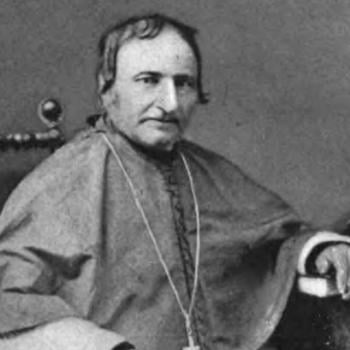The well-dressed young woman was standing offstage, a smile on her face that had a sad tilt to it, as though she pitied me for all I didn't know but was about to find out.
Although I'd never seen this particular University of Texas co-ed before, I knew who she was the moment I saw her, even before she took my hand, tilted her head to the side, and asked me, "So who, exactly, is Jesus to you?"
I knew who she was, because I've encountered her over and over in the past decade since I became a public theologian: the fellow Christian who doesn't like something I've said. And who cannot live quietly with that disagreement because it offends her (or his — usually his) notions of what a Christian needs to be, especially if that Christian is going to have the temerity to preach, teach, or write a book.
I'd just finished a public interview on my Oxford University Press book Entertaining Judgment, which is about the afterlife in literature and culture. This interview was onstage with a public radio anchor in a bar; you would think it a safely secular location. And, as the interviewer made clear in her introduction, although I am a person of genuine faith, a seminary-trained lay preacher in the Episcopal Church, this particular book is not about whether or not there is an afterlife, but a cultural study of how human imagination has helped supply details about the afterlife that may not be spelled out in Jewish and Christian holy texts.
But, honestly, no venue is safe where religion is concerned. It's been the same story every time I've talked about this book (which, again, is about how Lost and Dante and cathedral stained glass and South Park supplement the Bible in helping us make some meaning about what may happen to us when we die): I've been ambushed by fellow believers who don't like the approach I've taken, who disagree with my theology, or who find it somehow dangerous that I've been given a platform and am using it so poorly.
"Don't you think," this young lady said to me — after I'd answered her question by saying that Jesus was, to translate into her language, my Lord and Savior (or in my language, that he had rescued me from death and despair and made my life worth living) — "that you have a responsibility to tell people that they will burn forever in the Lake of Fire if they do not accept Jesus as their Lord and Savior?"
My smile froze on my face.
I am, as my wife could tell you, conflict avoidant. There are not that many ditches in which I am willing to die. But, as the years go by, I find it impossible to simply nod my head or mumble vague agreement in such situations.
I am a Christian, a believer in the Living God, a follower of the Two-Fold Commandment of Love.
I am a more religious person than I ever imagined I could be, publicly identified as a Christian, and often publicly ridiculed by skeptics and those outside the faith for that identification.
But if a fellow Christian doesn't like the lens through which I read the Bible, my theological stances, or my opposition to some of our culturally-conditioned Christian beliefs, I am called a heretic, a false teacher, or (as a caller to an NPR station recently had it) an ignoramus.
And I am sorry, but I will not go quietly into that good night.
This is a ditch I am willing to die in.
Christianity is on the decline in this country, facing historical disapproval ratings from the non-Christians we hope to reach, and even evangelical pollsters like the Barna Group have isolated some real reasons why: because skeptics consider Christians judgmental instead of loving, because they believe our churches do not offer connection to life-changing faith and practice, because they are put off by political and cultural stances they consider wrongheaded or backward, and because they do not trust Christian leaders, who "have not earned their positions of influence by proving their love of humankind."
But talk about not going quietly into that good night — these facts have only caused some Christians to double down on these divisive beliefs and practices. They call out those who are actually helping people outside our tradition to think of Christianity as a place of love, respect, and justice, of Jesus as the Lord of Love and not simply an avatar of justice.
Look up my friend Brian McLaren on Google. Do it. Open another window right now and do it.
Chances are that the second or third item that comes up will be an article about Brian as a "false teacher."





